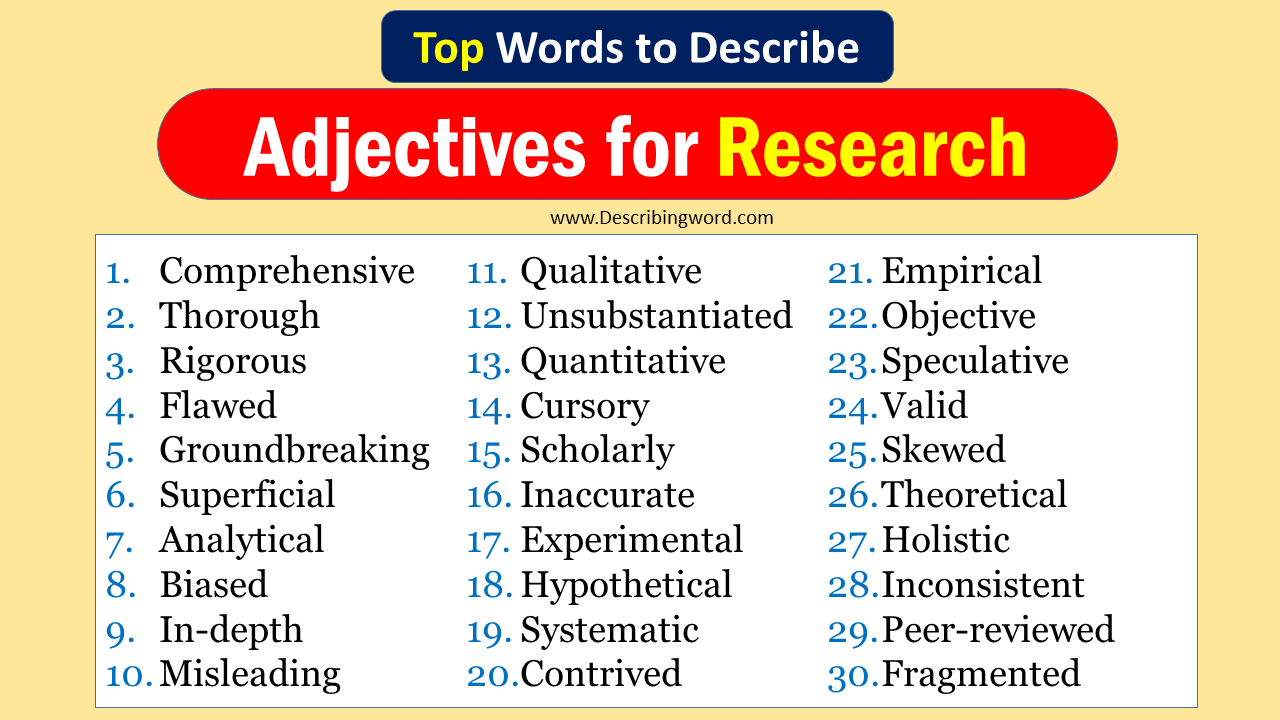Research, the backbone of many disciplines, can vary widely in quality and depth. This post provides adjectives that can help portray the nature and quality of any research endeavor.
Description of Research
Research refers to the systematic investigation into and study of materials or sources to establish facts and reach conclusions.
Words to Describe Research
Here are the 30 most common words to describe Research:
- Comprehensive
- Thorough
- Rigorous
- Flawed
- Groundbreaking
- Superficial
- Analytical
- Biased
- In-depth
- Misleading
- Qualitative
- Unsubstantiated
- Quantitative
- Cursory
- Scholarly
- Inaccurate
- Experimental
- Hypothetical
- Systematic
- Contrived
- Empirical
- Objective
- Speculative
- Valid
- Skewed
- Theoretical
- Holistic
- Inconsistent
- Peer-reviewed
- Fragmented
Positive Words to Describe Research
- Comprehensive
- Thorough
- Rigorous
- Groundbreaking
- Analytical
- In-depth
- Qualitative
- Quantitative
- Scholarly
- Empirical
Negative Words to Describe Research
- Flawed
- Superficial
- Biased
- Misleading
- Unsubstantiated
- Cursory
- Inaccurate
- Contrived
- Speculative
- Fragmented
Adjectives for Research (Meanings and Example Sentences)
Comprehensive
- Meaning: Covering all areas.
- Sentence: The study was comprehensive in scope.
Thorough
- Meaning: Done completely.
- Sentence: The review was thorough and detailed.
Rigorous
- Meaning: Strict and precise.
- Sentence: The testing was rigorous and exact.
Flawed
- Meaning: Having defects.
- Sentence: The theory was flawed and misleading.
Groundbreaking
- Meaning: Innovative.
- Sentence: Their findings were groundbreaking in nature.
Superficial
- Meaning: Lacking depth.
- Sentence: The analysis was superficial at best.
Analytical
- Meaning: Examining in detail.
- Sentence: An analytical approach was employed.
Biased
- Meaning: Showing favoritism.
- Sentence: The results seemed biased and skewed.
In-depth
- Meaning: Detailed study.
- Sentence: An in-depth review was conducted.
Misleading
- Meaning: Giving a wrong idea.
- Sentence: The data was misleading to readers.
Other Related Words to Describe Research
Words to Describe Research Skills
- Observant
- Meticulous
- Curious
- Inquisitive
- Critical
- Detail-oriented
- Perceptive
- Methodical
- Intuitive
- Investigative
Words to Describe Research Paper
- Informative
- Well-cited
- Comprehensive
- Coherent
- Insightful
- Well-structured
- Objective
- Convoluted
- Concise
- Extensive
Words to Describe Research Project
- Ambitious
- Collaborative
- Innovative
- Focused
- Multi-disciplinary
- Time-consuming
- Pioneering
- Longitudinal
- Cross-sectional
- Exploratory
Words to Describe Research Work
- Exhaustive
- Original
- Repetitive
- Replicable
- Foundational
- Uninspired
- Cutting-edge
- Paradigm-shifting
- Incremental
- Pivotal
Words to Describe Research Methodology
- Experimental
- Ethnographic
- Case-based
- Statistical
- Observational
- Longitudinal
- Cross-sectional
- Randomized
- Comparative
- Historical
How to Describe Research in Writing?
When describing research in writing, focus on its quality, scope, methodology, and relevance. Make use of appropriate adjectives to convey the depth, accuracy, and reliability of the research. Highlight its contributions, limitations, and the methods employed, providing a clear and balanced overview of the work done.
Related:
